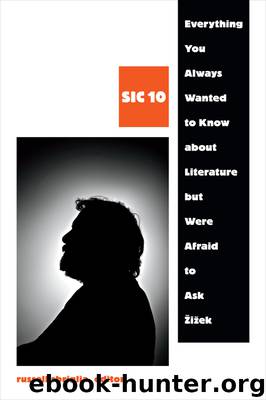Everything You Always Wanted to Know About Literature but Were Afraid to Ask Zizek: Sic 10 by Russell Sbriglia

Author:Russell Sbriglia
Language: eng
Format: epub
Tags: Literary Criticism, Semiotics & Theory
Publisher: Duke University Press
Published: 2017-03-03T01:13:05.510000+00:00
6
A Robot Runs through It:
Žižek and Ecocriticism
Andrew Hageman
Relics of bygone instruments of labour possess the same importance for the investigation of extinct economic formations of society as do fossil bones for the determination of extinct species of animals.
—Karl Marx, Capital
Cultivating the Seeds of Žižek’s Ecological Thought
From his early books, such as The Sublime Object of Ideology and Looking Awry, to his most recent ones, Less Than Nothing and Absolute Recoil, Slavoj Žižek has consistently included ecology in his work on ideology critique. Over the course of Žižek’s thinking and writing, ecology and ecological ideology have intensified in their significance, advancing from illustrative examples to central components of his political programs. While Looking Awry contains the seminal claim that “Nature does not exist” and The Sublime Object of Ideology deploys ecology to illustrate the Lacanian quilting point, Žižek devotes the entirety of the crucial last chapter of In Defense of Lost Causes to ecological crisis, and in First as Tragedy, Then as Farce he includes “the looming threat of an ecological catastrophe” as one of four antagonisms potentially capable of disrupting the otherwise seemingly inevitable reproduction of capitalism.1
Put simply, Žižek’s oeuvre offers a sustained and increasingly engaged approach to critiquing contemporary ecological ideology, although this particular stream of his thought has developed without literary illustrations or criticism. I raise this last point not as if it indicates a lack in Žižek’s thinking. Rather, I regard the absence of literature in his work on ecological ideology as an index of potential ecocritical work that Žižek has made possible in new and significant ways. In that spirit, this chapter aims to integrate Žižek’s work more deeply into ecological literary criticism—or, as it is more commonly called, ecocriticism—and at the same time to advance his work along the trajectory on which it is already in motion. As Tereza Stejskalová has convincingly argued, Žižek frequently invokes works of literature such as Sophocles’s Antigone and Herman Melville’s “Bartleby, the Scrivener” at crucial moments in his writing.2 Therefore, to put his ecological critique into conversation with literature is very much in line with Žižek’s own maneuvers.
Žižek’s work has already exerted some very significant influence in the field, in particular through Timothy Morton’s Ecology without Nature: Rethinking Environmental Aesthetics (2007), which instigated a radical reframing of ecocriticism.3 Still, much remains to be done. To that end, this chapter makes a clear case for ecocritics to produce more Žižek-inflected ecocriticism. Furthermore, it invites Žižek scholars not yet working in literary ecocriticism to explore and contribute to the field. This second group of readers might find ways to engage with and expand on ecocriticism by writing on extant work in much the same way that Marx intervened in literary criticism with his formidable writing on Szeliga-Vishnu’s critique of The Mysteries of Paris.4 I believe that literary ecocriticism needs more work committed to analyzing ecology in the social imaginary through the approaches and apparatuses that Žižek brings from Hegel, Marx, Freud, and Lacan, as well as the innovations he himself has created.
Download
This site does not store any files on its server. We only index and link to content provided by other sites. Please contact the content providers to delete copyright contents if any and email us, we'll remove relevant links or contents immediately.
| Books & Reading | Comparative Literature |
| Criticism & Theory | Genres & Styles |
| Movements & Periods | Reference |
| Regional & Cultural | Women Authors |
4 3 2 1: A Novel by Paul Auster(12375)
The handmaid's tale by Margaret Atwood(7757)
Giovanni's Room by James Baldwin(7330)
Asking the Right Questions: A Guide to Critical Thinking by M. Neil Browne & Stuart M. Keeley(5760)
Big Magic: Creative Living Beyond Fear by Elizabeth Gilbert(5756)
Ego Is the Enemy by Ryan Holiday(5415)
The Body: A Guide for Occupants by Bill Bryson(5082)
On Writing A Memoir of the Craft by Stephen King(4935)
Ken Follett - World without end by Ken Follett(4723)
Adulting by Kelly Williams Brown(4566)
Bluets by Maggie Nelson(4548)
Eat That Frog! by Brian Tracy(4526)
Guilty Pleasures by Laurell K Hamilton(4439)
The Poetry of Pablo Neruda by Pablo Neruda(4097)
Alive: The Story of the Andes Survivors by Piers Paul Read(4021)
White Noise - A Novel by Don DeLillo(4006)
Fingerprints of the Gods by Graham Hancock(3996)
The Book of Joy by Dalai Lama(3976)
The Bookshop by Penelope Fitzgerald(3844)
